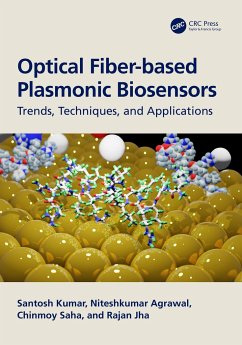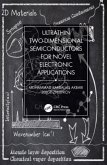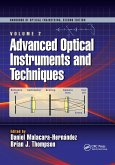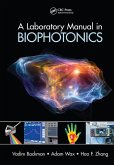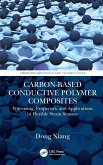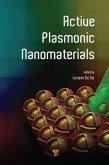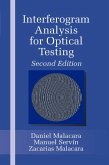Santosh Kumar, Niteshkumar Agrawal, Chinmoy Saha
Optical Fiber-based Plasmonic Biosensors
Trends, Techniques, and Applications
Santosh Kumar, Niteshkumar Agrawal, Chinmoy Saha
Optical Fiber-based Plasmonic Biosensors
Trends, Techniques, and Applications
- Gebundenes Buch
- Merkliste
- Auf die Merkliste
- Bewerten Bewerten
- Teilen
- Produkt teilen
- Produkterinnerung
- Produkterinnerung
This book discusses the history, physics, fundamental principles, sensing technologies, and characterization of plasmonic phenomenon-based fiber-optic biosensors, using optic-plasmonic sensors as a case study. It describes the plasmonic phenomenon and its application in optical fiber-based sensing, presented based on properties and usage of different nanomaterials spread across nine chapters. Content covers advances in nanomaterials, structural designing, and their scope in biomedical applications. Future developments of biosensing devices and related articulate methods are also…mehr
Andere Kunden interessierten sich auch für
![Flexible and Wearable Sensors Flexible and Wearable Sensors]() Flexible and Wearable Sensors49,99 €
Flexible and Wearable Sensors49,99 €![Ultrathin Two-Dimensional Semiconductors for Novel Electronic Applications Ultrathin Two-Dimensional Semiconductors for Novel Electronic Applications]() Mohammad Karbalaei AkbariUltrathin Two-Dimensional Semiconductors for Novel Electronic Applications55,99 €
Mohammad Karbalaei AkbariUltrathin Two-Dimensional Semiconductors for Novel Electronic Applications55,99 €![Advanced Optical Instruments and Techniques Advanced Optical Instruments and Techniques]() Advanced Optical Instruments and Techniques96,99 €
Advanced Optical Instruments and Techniques96,99 €![A Laboratory Manual in Biophotonics A Laboratory Manual in Biophotonics]() Vadim BackmanA Laboratory Manual in Biophotonics53,99 €
Vadim BackmanA Laboratory Manual in Biophotonics53,99 €![Carbon-Based Conductive Polymer Composites Carbon-Based Conductive Polymer Composites]() Dong XiangCarbon-Based Conductive Polymer Composites153,99 €
Dong XiangCarbon-Based Conductive Polymer Composites153,99 €![Active Plasmonic Nanomaterials Active Plasmonic Nanomaterials]() Active Plasmonic Nanomaterials165,99 €
Active Plasmonic Nanomaterials165,99 €![Interferogram Analysis for Optical Testing Interferogram Analysis for Optical Testing]() Zacarias MalacaraInterferogram Analysis for Optical Testing65,99 €
Zacarias MalacaraInterferogram Analysis for Optical Testing65,99 €-
-
-
This book discusses the history, physics, fundamental principles, sensing technologies, and characterization of plasmonic phenomenon-based fiber-optic biosensors, using optic-plasmonic sensors as a case study. It describes the plasmonic phenomenon and its application in optical fiber-based sensing, presented based on properties and usage of different nanomaterials spread across nine chapters. Content covers advances in nanomaterials, structural designing, and their scope in biomedical applications. Future developments of biosensing devices and related articulate methods are also described.
Features:
Gives a comprehensive view on the nanomaterials used in plasmonic optical fiber biosensorsIncludes synthesis, characterization, and usage for detection of different analytesDiscusses trends in the design of wavelength-based optical fiber sensorsReviews micro- and nanostructured biosensing devicesExplores application of plasmonic sensors in the biosensing field
This book is aimed at researchers and graduate students in Optical Communications, Biomedical Engineering, Optics, Sensors, Instrumentation, and Measurement.
Features:
Gives a comprehensive view on the nanomaterials used in plasmonic optical fiber biosensorsIncludes synthesis, characterization, and usage for detection of different analytesDiscusses trends in the design of wavelength-based optical fiber sensorsReviews micro- and nanostructured biosensing devicesExplores application of plasmonic sensors in the biosensing field
This book is aimed at researchers and graduate students in Optical Communications, Biomedical Engineering, Optics, Sensors, Instrumentation, and Measurement.
Produktdetails
- Produktdetails
- Verlag: CRC Press / Taylor & Francis
- Seitenzahl: 280
- Erscheinungstermin: 30. Dezember 2022
- Englisch
- Abmessung: 185mm x 262mm x 23mm
- Gewicht: 716g
- ISBN-13: 9781032152370
- ISBN-10: 1032152370
- Artikelnr.: 65612029
- Herstellerkennzeichnung Die Herstellerinformationen sind derzeit nicht verfügbar.
- Verlag: CRC Press / Taylor & Francis
- Seitenzahl: 280
- Erscheinungstermin: 30. Dezember 2022
- Englisch
- Abmessung: 185mm x 262mm x 23mm
- Gewicht: 716g
- ISBN-13: 9781032152370
- ISBN-10: 1032152370
- Artikelnr.: 65612029
- Herstellerkennzeichnung Die Herstellerinformationen sind derzeit nicht verfügbar.
Santosh Kumar received the Ph.D. degree from IIT (ISM) Dhanbad, Dhanbad, India. He is currently an Associate Professor with the School of Physics Science and Information Technology, Liaocheng University, Liaocheng, China. He is ranked in the top 2% of the world's scientists by Stanford University's 2020 data ranking. He has guided eight M.Tech. dissertations and six Ph.D. candidates. He has published more than 200 research articles in national and international SCI journals and conferences. He has over 2100 citations and an h-index of 26 in a variety of high-impact journals, including Biosensors and Bioelectronics, Biosensors, Journal of Lightwave Technology, Optics Express, and various IEEE Transactions. He has presented many articles at conferences held in India, China, Belgium, and USA. He has published two books entitled Fiber Optic Communication: Optical Waveguides, Devices and Applications (University Press, 2017), India, and another book entitled 2D Materials for Surface Plasmon Resonance-Based Sensors (CRC Press, Taylor & Francis Group, 2021). He has recently filed a patent application for optical fiber sensing technology. He has reviewed more than 1000 SCI journals of IEEE, Elsevier, Springer, OPTICA, SPIE, and Nature. He is a Life Fellow Member of the Optical Society of India (OSI) and a Senior Member of IEEE, OPTICA and SPIE. He is also a Traveling Lecturer of OPTICA. He collaborates closely with a number of renowned universities in India, China, Portugal, Brazil, and Italy to conduct scientific research. He is capable of effective teaching and conducting high-quality research in the fields of electronics and communications engineering, as well as physics, with an emphasis on fiber optic sensors, photonics and plasmonic devices, nano and biophotonics, waveguides and interferometers. He has been appointed Chair of the Optica Optical Biosensor Technical Group and Associate Editor for IEEE Sensors Journal, IEEE Access, IEEE Transactions on NanoBioscience, Frontiers in Physics, and Biomedical Optics Express. Niteshkumar Agrawal (S¿19¿M¿22) received his Ph.D. degree from the Indian Institute of Space Science and Technology, Thiruvananthapuram, Kerala, India, and M.Tech. degrees from the Indian Institute of Technology (IIT-ISM), Dhanbad, Jharkhand, India. He is currently working as an Associate Professor at MES¿s PCE, Mahatma Education Society, Navi Mumbai, Maharashtra, India. He is a Former Visiting Researcher at Shandong Key Laboratory of Optical Communication Science and Technology, Liaocheng University (LCU), Shandong, China. He has delivered 20+ invited talks at various institutions, and organizations of repute. He has more than 20+ publications in peer-reviewed National and International Journals of Repute and Conference Proceedings. He has received an "All India Council for Technical Education- Indian National Academy of Engineering/Department of Space-TRF (AICTE-INAE/DoS-TRF)" fellowship during his doctoral degree. He is an Industry Coordinator of IEEE EMBS Chapter, Kerala State, India. He is on the board of reviewers of IEEE Transactions on NanoBioscience, and IEEE Sensors Journal. He is an active member of various technical societies like IEEE, OSA, and SPIE. His current research interests include Optical/Plasmonic/Bio-Sensors, Nanomaterials, Nanotechnology, Optical Communication, Avionics, and Space Communication. Chinmoy Saha (MIEEE¿06¿SMIEEE¿15, SM URSI) received his B.Tech, M.Tech. and PhD degrees in Radio Physics and Electronics, University of Calcutta, Kolkata, India in 2002, 2005 and 2012 respectively. He is currently working as an Associate Professor in the Department of Avionics, Indian Institute of Space Science and Technology, Department of Space, Government of India. He has visited several International Universities of repute, like, Royal Military College of Canada (RMC), Queens University, ON, Canada during 2015-2018 in various capacities and having collaborative research with RMC Canada, Kingston, Ontario and Queens University, Canada. He is a senior Member of the IEEE, Senior member of International Union of Radio Science and a life member of IETE. He is the founding chairman of IEEE MTT-S Kerala chapter. He has served as the Chairman of Antennas and Propagation Chapter of IEEE Kerala section during 2018-2019. Dr. Saha has received several prestigious awards which includes National Award "AICTE Visvesvaraya Best Teacher Award 2021" received form Union Education minister, Government of India, "IETE Prof. SN Mitra Memorial Award 2021", "Outstanding Teacher Award" in 2019 from Department of Avionics, IIST, "National Scholarship from Ministry of Human Resource Development" from Government of India, " Outstanding Contribution Award from the AP-MTT Kolkata chapter, "Best Contribution Award for Notable Services and Significant Contributions towards the Advancements of IEEE and the Engineering Profession" from IEEE Kolkata Section and several best paper awards in various International conferences. His current research interest includes Wireless Power Transfer (WPT) and Energy Harvesting, Channel Modeling for WB/UWB systems, Microwave Circuits, Engineered Materials, Metamaterial Inspired Antennas and Circuits, reconfigurable and multi-functional antennas for modern wireless applications, mm-wave THz antennas and antennas and components for space applications. He has more than hundred fifty publications including 40 journal papers in peer reviewed National and International Journals and conference Proceedings and authored two books with Cambridge University Press, UK (https://www.amazon.in/Basic-Electronics-Applications-Chinmoy-Saha/dp/1316632938) and Taylor and Francis, USA (https://www.crcpress.com/Multifunctional-Ultrawideband-Antennas-Trends-Techniques-and-Applications/Saha-Siddiqui-Antar/p/book/9781138553545). He is on the board of reviewers of several international journals of repute including IEEE Transaction in Microwave Theory and Techniques, IEEE Transaction in Antennas and Propagation, IEEE Antennas and Wireless Propagation Letters (IEEE AWPL), IET Microwaves, Antennas and Propagation, Electronic Letters, Nature Scientific Reports etc. He is an associate editor in IEEE Access and International Journal of RF and Microwave Computer Aided Engineering, Wiley and guest editor in Chief for a special issue in the same journal. Rajan Jha did his MSc and PhD from IIT Delhi in 2001 and 2007 respectively, was a postdoctoral fellow at ICFO Barcelona during 2009-2010 and visiting scientist in TU Berlin-2013. Currently, he is an Associate Professor at the Discipline of Physics, School of Basics Sciences at IIT Bhubaneswar, India. His research includes high resolution interferometers and their combinations based multi-parameter interrogation systems, flexible/wearable photonic systems, cavity resonator sensors, plasmon coupled configurations and nanoscale interaction platforms for quantum technologies. He is an inventor of 8 patents & has published in more than 110 internationally research articles and 75 conferences papers. He was selected as an Optica (formerly OSA) Ambassador and Senior Member in 2017. He was awarded DAAD Fellowship (2013), and the JSPS Fellowship in 2009. He was a Regular Associate of the International Centre for Theoretical Physics (ICTP), Italy (2016-2021) and young associate/member of all the Science Academies of India. For his breakthrough contribution in design and development of photonics devices and promoting research activities in India, he is a recipient of the 2015 ICO/ICTP Gallieno Denardo award. Recently, he has been awarded as SERB-STAR Fellowship (Physical Sciences) from Govt. of India.
1. Fundamentals of Plasmonics Sensors. 2. Important Nanomaterials for Optical Fiber Plasmonic Biosensors. 3. Design Methodology. 4. Gold Nanoparticles assisted Optical Fiber-based Plasmonic Biosensors. 5. Silver Nanoparticles assisted Optical Fiber-based Plasmonic Biosensors. 6. Graphene Oxide Coated Gold Nanoparticles-based Fiber Optic LSPR Sensor. 7. Fiber Optic LSPR Sensor using Graphene Oxide Coated Silver Nanostructures. 8. Novel Nanomaterials assisted Optical Fiber-based Plasmonic Biosensors. 9. Optical Sensors for Detection of Microorganisms.
1. Fundamentals of Plasmonics Sensors. 2. Important Nanomaterials for
Optical Fiber Plasmonic Biosensors. 3. Design Methodology. 4. Gold
Nanoparticles assisted Optical Fiber-based Plasmonic Biosensors. 5. Silver
Nanoparticles assisted Optical Fiber-based Plasmonic Biosensors. 6.
Graphene Oxide Coated Gold Nanoparticles-based Fiber Optic LSPR Sensor. 7.
Fiber Optic LSPR Sensor using Graphene Oxide Coated Silver Nanostructures.
8. Novel Nanomaterials assisted Optical Fiber-based Plasmonic Biosensors.
9. Optical Sensors for Detection of Microorganisms.
Optical Fiber Plasmonic Biosensors. 3. Design Methodology. 4. Gold
Nanoparticles assisted Optical Fiber-based Plasmonic Biosensors. 5. Silver
Nanoparticles assisted Optical Fiber-based Plasmonic Biosensors. 6.
Graphene Oxide Coated Gold Nanoparticles-based Fiber Optic LSPR Sensor. 7.
Fiber Optic LSPR Sensor using Graphene Oxide Coated Silver Nanostructures.
8. Novel Nanomaterials assisted Optical Fiber-based Plasmonic Biosensors.
9. Optical Sensors for Detection of Microorganisms.
1. Fundamentals of Plasmonics Sensors. 2. Important Nanomaterials for Optical Fiber Plasmonic Biosensors. 3. Design Methodology. 4. Gold Nanoparticles assisted Optical Fiber-based Plasmonic Biosensors. 5. Silver Nanoparticles assisted Optical Fiber-based Plasmonic Biosensors. 6. Graphene Oxide Coated Gold Nanoparticles-based Fiber Optic LSPR Sensor. 7. Fiber Optic LSPR Sensor using Graphene Oxide Coated Silver Nanostructures. 8. Novel Nanomaterials assisted Optical Fiber-based Plasmonic Biosensors. 9. Optical Sensors for Detection of Microorganisms.
1. Fundamentals of Plasmonics Sensors. 2. Important Nanomaterials for
Optical Fiber Plasmonic Biosensors. 3. Design Methodology. 4. Gold
Nanoparticles assisted Optical Fiber-based Plasmonic Biosensors. 5. Silver
Nanoparticles assisted Optical Fiber-based Plasmonic Biosensors. 6.
Graphene Oxide Coated Gold Nanoparticles-based Fiber Optic LSPR Sensor. 7.
Fiber Optic LSPR Sensor using Graphene Oxide Coated Silver Nanostructures.
8. Novel Nanomaterials assisted Optical Fiber-based Plasmonic Biosensors.
9. Optical Sensors for Detection of Microorganisms.
Optical Fiber Plasmonic Biosensors. 3. Design Methodology. 4. Gold
Nanoparticles assisted Optical Fiber-based Plasmonic Biosensors. 5. Silver
Nanoparticles assisted Optical Fiber-based Plasmonic Biosensors. 6.
Graphene Oxide Coated Gold Nanoparticles-based Fiber Optic LSPR Sensor. 7.
Fiber Optic LSPR Sensor using Graphene Oxide Coated Silver Nanostructures.
8. Novel Nanomaterials assisted Optical Fiber-based Plasmonic Biosensors.
9. Optical Sensors for Detection of Microorganisms.

